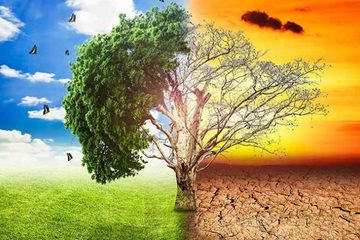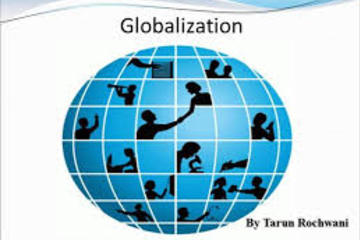We found 74 results that contain "global"
Posted on: #iteachmsu


Global Warming (Globalization)
Global warming is a term used for the observed century-scale rise in the average temperature of the Earth's climate system and its related effects. Scientists are more than 95% certain that nearly all of global warming is caused by increasing concentrations of greenhouse gases (GHGs) and other human-caused emissions.
NAVIGATING CONTEXT
Posted on: #iteachmsu


Globalization
Globalization means the speedup of movements and exchanges (of human beings, goods, and services, capital, technologies, or cultural practices) all over the planet. One of the effects of globalization is that it promotes and increases interactions between different regions and populations around the globe.
ASSESSING LEARNING
Posted on: #iteachmsu


Mapping the global threat of land subsidence
Subsidence, the lowering of Earth's land surface, is a potentially destructive hazard that can be caused by a wide range of natural or anthropogenic triggers but mainly results from solid or fluid mobilization underground. Subsidence due to groundwater depletion (1) is a slow and gradual process that develops on large time scales (months to years), producing progressive loss of land elevation (centimeters to decimeters per year) typically over very large areas (tens to thousands of square kilometers) and variably affects urban and agricultural areas worldwide. Subsidence permanently reduces aquifer-system storage capacity, causes earth fissures, damages buildings and civil infrastructure, and increases flood susceptibility and risk.
Posted on: #iteachmsu


Mapping the global threat of land subsidence
Subsidence, the lowering of Earth's land surface, is a potentially destructive hazard that can be caused by a wide range of natural or anthropogenic triggers but mainly results from solid or fluid mobilization underground. Subsidence due to groundwater depletion (1) is a slow and gradual process that develops on large time scales (months to years), producing progressive loss of land elevation (centimeters to decimeters per year) typically over very large areas (tens to thousands of square kilometers) and variably affects urban and agricultural areas worldwide. Subsidence permanently reduces aquifer-system storage capacity, causes earth fissures, damages buildings and civil infrastructure, and increases flood susceptibility and risk.
Posted on: #iteachmsu


Connecting Knowledge to Action through Global Education Competency
Competency Info
This is the second micro-credential in the “21st Century Learning through Global Education” stack. It is encouraged that the micro-credentials in this stack are earned in sequence, as each skill builds on the previous one in the stack.
The educator builds upon the identified considerations for practice by incorporating strategies and activities that support global education practices. The educator reflects and categorizes them according to the four global competencies.
This is the second micro-credential in the “21st Century Learning through Global Education” stack. It is encouraged that the micro-credentials in this stack are earned in sequence, as each skill builds on the previous one in the stack.
The educator builds upon the identified considerations for practice by incorporating strategies and activities that support global education practices. The educator reflects and categorizes them according to the four global competencies.
NAVIGATING CONTEXT
Posted on: #iteachmsu

Human trafficking-considered modern-day slavery- is a global problem and is becoming increasingly pr
Human trafficking-considered modern-day slavery- is a global problem and is becoming increasingly prevalent across the World. Types and venues of trafficking in the United States Identifying victims of trafficking in healthcare settings Identifying warning signs of trafficking in healthcare settings for minors and adults Identifying resources for reporting suspected victims of human trafficking. The training requirement dictates a timeline beginning with the first renewal cycle for the period of 2017-2022. Let's talk more and research many areas, So join us by registering
The timeline for the training of individuals who are seeking initial nursing licensure - is 5 or more years of experience.
The timeline for the training of individuals who are seeking initial nursing licensure - is 5 or more years of experience.
Posted on: #iteachmsu


Global warming
Global warming is the long-term heating of Earth's climate system observed since the pre-industrial period (between 1850 and 1900) due to human activities, primarily fossil fuel burning, which increases heat-trapping greenhouse gas levels in Earth's atmosphere.
Authored by: admin
Posted on: #iteachmsu


Global Warming
Earth has warmed and cooled time and again. Climate has changed when the planet received more or less sunlight due to subtle shifts in its orbit, as the atmosphere or surface changed, or when the Sun’s energy varied. But in the past century, another force has started to influence Earth’s climate: humanity
How does this warming compare to previous changes in Earth’s climate? How can we be certain that human-released greenhouse gases are causing warming? How much more will the Earth warm? How will Earth respond? Answering these questions is perhaps the most significant scientific challenge of our time.
What is Global Warming?
Global warming is the unusually rapid increase in Earth’s average surface temperature over the past century primarily due to the greenhouse gases released as people burn fossil fuels. The global average surface temperature rose 0.6 to 0.9 degrees Celsius (1.1 to 1.6° F) between 1906 and 2005, and the rate of temperature increase has nearly doubled in the last 50 years.
How does this warming compare to previous changes in Earth’s climate? How can we be certain that human-released greenhouse gases are causing warming? How much more will the Earth warm? How will Earth respond? Answering these questions is perhaps the most significant scientific challenge of our time.
What is Global Warming?
Global warming is the unusually rapid increase in Earth’s average surface temperature over the past century primarily due to the greenhouse gases released as people burn fossil fuels. The global average surface temperature rose 0.6 to 0.9 degrees Celsius (1.1 to 1.6° F) between 1906 and 2005, and the rate of temperature increase has nearly doubled in the last 50 years.
Authored by: Rupali
Assessing Learning
Posted on: #iteachmsu

President Trump's "America First" strategy of the last four years had increased tensions between the United States and the rest of the world, specifically China. It was already leading to friction in the smooth supply-and-demand economic chain that has been the hallmark of an interdependent global world. But the self-isolation during the pandemic could mean the end of globalization as we know it.
Some people worry that this moment is strengthening the hand of nationalism that was rising before the pandemic and that it is accelerating the changing relationships between countries.
End of globalization?
President Trump's "America First" strategy of the last four years had increased tensions between the United States and the rest of the world, specifically China. It was already leading to friction in the smooth supply-and-demand economic chain that has been the hallmark of an interdependent global world. But the self-isolation during the pandemic could mean the end of globalization as we know it.
Some people worry that this moment is strengthening the hand of nationalism that was rising before the pandemic and that it is accelerating the changing relationships between countries.
Authored by: PALLAVI GOGOI
Posted on: #iteachmsu


Global burden of dengue
The incidence of dengue has grown dramatically around the world in recent decades. A vast majority of cases are asymptomatic or mild and self-managed, and hence the actual numbers of dengue cases are under-reported. Many cases are also misdiagnosed as other febrile illnesses [1].
One modelling estimate indicates 390 million dengue virus infections per year (95% credible interval 284–528 million), of which 96 million (67–136 million) manifest clinically (with any severity of disease) [2]. Another study on the prevalence of dengue estimates that 3.9 billion people are at risk of infection with dengue viruses. Despite a risk of infection existing in 129 countries [3], 70% of the actual burden is in Asia [2].
The number of dengue cases reported to WHO increased over 8 fold over the last two decades, from 505,430 cases in 2000, to over 2.4 million in 2010, and 4.2 million in 2019. Reported deaths between the year 2000 and 2015 increased from 960 to 4032.
This alarming increase in case numbers is partly explained by a change in national practices to record and report dengue to the Ministries of Health, and to the WHO. But it also represents government recognition of the burden, and therefore the pertinence to report dengue disease burden. Therefore, although the full global burden of the disease is uncertain, this observed growth only brings us closer to a more accurate estimate of the full extent of the burden.
One modelling estimate indicates 390 million dengue virus infections per year (95% credible interval 284–528 million), of which 96 million (67–136 million) manifest clinically (with any severity of disease) [2]. Another study on the prevalence of dengue estimates that 3.9 billion people are at risk of infection with dengue viruses. Despite a risk of infection existing in 129 countries [3], 70% of the actual burden is in Asia [2].
The number of dengue cases reported to WHO increased over 8 fold over the last two decades, from 505,430 cases in 2000, to over 2.4 million in 2010, and 4.2 million in 2019. Reported deaths between the year 2000 and 2015 increased from 960 to 4032.
This alarming increase in case numbers is partly explained by a change in national practices to record and report dengue to the Ministries of Health, and to the WHO. But it also represents government recognition of the burden, and therefore the pertinence to report dengue disease burden. Therefore, although the full global burden of the disease is uncertain, this observed growth only brings us closer to a more accurate estimate of the full extent of the burden.
Authored by: WHO Organization
Posted on: #iteachmsu


Incorporating Global Education into Practice
Global education helps
students develop their capacity to be informed, open-minded, and responsible people, who are responsive to diverse perspectives. Global education prepares us to address the world’s most pressing issues collaboratively, equitably, and sustainably. Global education helps students understand that pressing issues must be faced in an interdisciplinary way, given the complexity of environments and competing needs and interests.
The primary aim of Global Citizenship: Education (GCED) is nurturing respect for all, building a sense of belonging to a common humanity, and helping learners become responsible and active global citizens. GCED aims to empower learners to assume active roles to face and resolve global challenges and to become proactive contributors to a more peaceful, tolerant, inclusive, and secure world. Education for global citizenship helps young people develop the core competencies which allow them to actively engage with the world and help make it a more just and sustainable place. It is a form of civic learning that involves students’ active participation in projects that address global issues of a social, political, economic, or environmental nature.
students develop their capacity to be informed, open-minded, and responsible people, who are responsive to diverse perspectives. Global education prepares us to address the world’s most pressing issues collaboratively, equitably, and sustainably. Global education helps students understand that pressing issues must be faced in an interdisciplinary way, given the complexity of environments and competing needs and interests.
The primary aim of Global Citizenship: Education (GCED) is nurturing respect for all, building a sense of belonging to a common humanity, and helping learners become responsible and active global citizens. GCED aims to empower learners to assume active roles to face and resolve global challenges and to become proactive contributors to a more peaceful, tolerant, inclusive, and secure world. Education for global citizenship helps young people develop the core competencies which allow them to actively engage with the world and help make it a more just and sustainable place. It is a form of civic learning that involves students’ active participation in projects that address global issues of a social, political, economic, or environmental nature.
Authored by: chathu
Disciplinary Content
Posted on: #iteachmsu


Connecting Knowledge to Action through Global Education Competency
Global Education
Global education helps students develop their capacity to be informed, open-minded, and responsible people who are responsive to diverse perspectives. Global education prepares us to address the world’s most pressing issues collaboratively, equitably, and sustainably. Global education helps students understand that pressing issues must be faced in an interdisciplinary way, given the complexity of environments and competing needs and interests.
Through global education, students will prepare to thrive and lead change in an interconnected world. Students will engage in dimensions of cultural diversity to reach common understandings and goals. Through a stronger awareness of global issues, students will be able to address today’s greatest challenges and make a difference in the world, both collaboratively and equitably.
Global education helps students develop their capacity to be informed, open-minded, and responsible people who are responsive to diverse perspectives. Global education prepares us to address the world’s most pressing issues collaboratively, equitably, and sustainably. Global education helps students understand that pressing issues must be faced in an interdisciplinary way, given the complexity of environments and competing needs and interests.
Through global education, students will prepare to thrive and lead change in an interconnected world. Students will engage in dimensions of cultural diversity to reach common understandings and goals. Through a stronger awareness of global issues, students will be able to address today’s greatest challenges and make a difference in the world, both collaboratively and equitably.
Authored by: Clark County Education Association
Navigating Context
Posted on: #iteachmsu


Measuring Global Ocean Heat Content to Estimate the Earth Energy Imbalance
Estimating and analyzing the Earth Energy Imbalance (EEI) is essential for understanding the evolution of the Earth’s climate. This is possible only through a careful computation and monitoring of the climate-energy budget. The climate system exchanges energy with outer space at the top of the atmosphere (TOA) (through radiation) and with solid Earth at the Earth’s crust surface (essentially through geothermal flux). If the climate system were free from external perturbations and internal variability during millennia, then the climate-energy budget would be in a steady state in which the net TOA radiation budget compensates the geothermal flux of +0.08 Wm–2 (Davies and Davies, 2010).
But the climate system is not free from external perturbations and from internal variability. Although the geothermal flux does not generate any perturbations at interannual to millennial time scales (because it varies only at geological time scales), other external forcings from natural origin (such as the solar radiation, the volcanic activity) or anthropogenic origin (such as Greenhouse Gas emissions –GHG-) perturb the system.
REf:https://www.frontiersin.org/articles/10.3389/fmars.2019.00432/full
But the climate system is not free from external perturbations and from internal variability. Although the geothermal flux does not generate any perturbations at interannual to millennial time scales (because it varies only at geological time scales), other external forcings from natural origin (such as the solar radiation, the volcanic activity) or anthropogenic origin (such as Greenhouse Gas emissions –GHG-) perturb the system.
REf:https://www.frontiersin.org/articles/10.3389/fmars.2019.00432/full
Posted by: Chathuri Hewapathirana
Disciplinary Content
Posted on: #iteachmsu

You're Not Welcome Here: How Social Distancing Can Destroy The Global Economy
It's what people are being asked to tell each other. Less than 10 days ago, London banned people who live in different households from meeting each other indoors, to stop the spread of the coronavirus.
"Nobody wants to see more restrictions, but this is deemed to be necessary in order to protect Londoners' lives," London Mayor Sadiq Khan told the London Assembly.
Taking away the welcome mat is key to cutting off the path of the coronavirus. From the beginning of the pandemic, cities, states, and countries have banned each other. And now, eight months into lockdowns that have led to immense stress and fatigue among people, some places around the world are introducing even more draconian measures.24
The path toward recovery continues to be inherently antisocial and runs counter to how humans interact, live lives, and conduct their business. This unwelcome policy — which has already harmed families, societies, and economies — has the potential to lead to a tectonic shift in how the world functions in the foreseeable future.
"Nobody wants to see more restrictions, but this is deemed to be necessary in order to protect Londoners' lives," London Mayor Sadiq Khan told the London Assembly.
Taking away the welcome mat is key to cutting off the path of the coronavirus. From the beginning of the pandemic, cities, states, and countries have banned each other. And now, eight months into lockdowns that have led to immense stress and fatigue among people, some places around the world are introducing even more draconian measures.24
The path toward recovery continues to be inherently antisocial and runs counter to how humans interact, live lives, and conduct their business. This unwelcome policy — which has already harmed families, societies, and economies — has the potential to lead to a tectonic shift in how the world functions in the foreseeable future.
Authored by: PALLAVI GOGOI
Disciplinary Content
Posted on: #iteachmsu

Global education and global competence prepare students for the 21st century. Nearly every major issue facing people has a global dimension, from climate change to economics. Schools must prepare students to be globally competent by being able to both understand and act upon issues of global significance.
Posted by: Chathuri Super admin..
Disciplinary Content
Posted on: #iteachmsu
![Article preview image]()
Globalisation and Education in the Postcolonial World:
Towards a conceptual framework The article examines the relevance of existing accounts of globalisation and education for low income, postcolonial countries, with special reference to the education systems of sub-Saharan Africa. Using recent developments in globalisation theory, existing accounts are analysed in relation to their view of the origins, nature and future trajectory of globalisation and the implications for education. It is argued that most of the recent literature deals with Western industrialised countries and the newly industrialised countries of the Pacific Rim and therefore has limited relevance for low income countries. The literature that is concerned with low income countries often lacks a firm theoretical basis and has been limited to a discussion of the impact of economic globalisation on education. Drawing on recent work on the political economy of development and the state in Africa, the article sets out a conceptual framework for understanding various aspects of the education/globalisation relationship in low income, postcolonial countries including economic, political and cultural aspects.
Towards a conceptual framework The article examines the relevance of existing accounts of globalisation and education for low income, postcolonial countries, with special reference to the education systems of sub-Saharan Africa. Using recent developments in globalisation theory, existing accounts are analysed in relation to their view of the origins, nature and future trajectory of globalisation and the implications for education. It is argued that most of the recent literature deals with Western industrialised countries and the newly industrialised countries of the Pacific Rim and therefore has limited relevance for low income countries. The literature that is concerned with low income countries often lacks a firm theoretical basis and has been limited to a discussion of the impact of economic globalisation on education. Drawing on recent work on the political economy of development and the state in Africa, the article sets out a conceptual framework for understanding various aspects of the education/globalisation relationship in low income, postcolonial countries including economic, political and cultural aspects.
Posted by: Chathuri Super admin..
Assessing Learning
Posted on: #iteachmsu

The primary aim of Global Citizenship Education (GCED) is nurturing respect for all, building a sense of belonging to common humanity, and helping learners become responsible and active global citizens. GCED aims to empower learners to assume active roles to face and resolve global challenges and to become proactive contributors to a more peaceful, tolerant, inclusive,
Posted by: Chathuri Super admin..
Assessing Learning
Posted on: #iteachmsu

Global education is built upon a foundation of knowledge and understanding but frames learning within the lens of rigorous study. This incorporates investigations, recognizing perspectives, communicating ideas, and taking action. The impact on student learning is great. Research has demonstrated that students who learn content through authentic tasks and real-world experiences are more likely to engage in learning,
Posted by: Chathuri Super admin..
Posted on: #iteachmsu

The educator builds upon the identified considerations for practice by incorporating strategies and activities that support global education practices. The educator reflects and categorizes them according to the four global competencies.
Posted by: Roni Smith
Navigating Context
Posted on: #iteachmsu

The appeal of forming virtual teams is clear. Employees can manage their work and personal lives more flexibly, and they have the opportunity to interact with colleagues around the world. Companies can use the best and lowest-cost global talent and significantly reduce their real estate costs.
But virtual teams are hard to get right. In their seminal 2001 study of 70 such groups, professors Vijay Govindarajan and Anil Gupta found that 82% fell short of their goals and 33% rated themselves as largely unsuccessful. A 2005 Deloitte study of IT projects outsourced to virtual work groups found that 66% failed to satisfy the clients’ requirements. And in our research, we’ve discovered that most people consider virtual communication less productive than face-to-face interaction, and nearly half admit to feeling confused and overwhelmed by collaboration technology.
There is good news, however. A 2009 study of 80 global software teams by authors from BCG and WHU-Otto Beisheim School of Management indicates that well-managed dispersed teams can actually outperform those that share office space. Similarly, an Aon Consulting report noted that using virtual teams can improve employee productivity; some organizations have seen gains of up to 43%.
https://hbr.org/2014/12/getting-virtual-teams-right
But virtual teams are hard to get right. In their seminal 2001 study of 70 such groups, professors Vijay Govindarajan and Anil Gupta found that 82% fell short of their goals and 33% rated themselves as largely unsuccessful. A 2005 Deloitte study of IT projects outsourced to virtual work groups found that 66% failed to satisfy the clients’ requirements. And in our research, we’ve discovered that most people consider virtual communication less productive than face-to-face interaction, and nearly half admit to feeling confused and overwhelmed by collaboration technology.
There is good news, however. A 2009 study of 80 global software teams by authors from BCG and WHU-Otto Beisheim School of Management indicates that well-managed dispersed teams can actually outperform those that share office space. Similarly, an Aon Consulting report noted that using virtual teams can improve employee productivity; some organizations have seen gains of up to 43%.
https://hbr.org/2014/12/getting-virtual-teams-right
Posted by: Chathuri Super admin..
Assessing Learning
Posted on: #iteachmsu


Ref : https://www.npr.org/2020/10/26/927064268/youre-not-welcome-here-how-social-distancing-can-destroy-the-global-economy
Posted by: Greg Thomsan
Disciplinary Content
Posted on: #iteachmsu


"Nobody wants to see more restrictions, but this is deemed to be necessary in order to protect Londoners' lives," London Mayor Sadiq Khan told the London Assembly. https://www.npr.org/2020/10/26/927064268/youre-not-welcome-here-how-social-distancing-can-destroy-the-global-economy
Posted by: Greg Thomsan
Navigating Context
Host: MSU Libraries

The Lucky Ones: A Memoir with Author Zara Chowdhary
Please join us for a special Muslim Journeys session led by author Zara Chowdhary. Chowdhary’s memoir recounts surviving the 2002 massacres at Ahmedabad, India, and delves into the history of her multigenerational Muslim family. Free and open to the public. All are welcome, light refreshments served.
More information, including how to obtain the book at: https://libguides.lib.msu.edu/muslimstudies/muslimjourneys.
Co-sponsored by: MSU Creative Writing Program, Islamic Society of Greater Lansing, One Love Global
For parking information visit http://maps.msu.edu/interactive.
Persons with disabilities may request accommodations by emailing Lib.DL.accessibility@msu.edu.
Navigating Context




